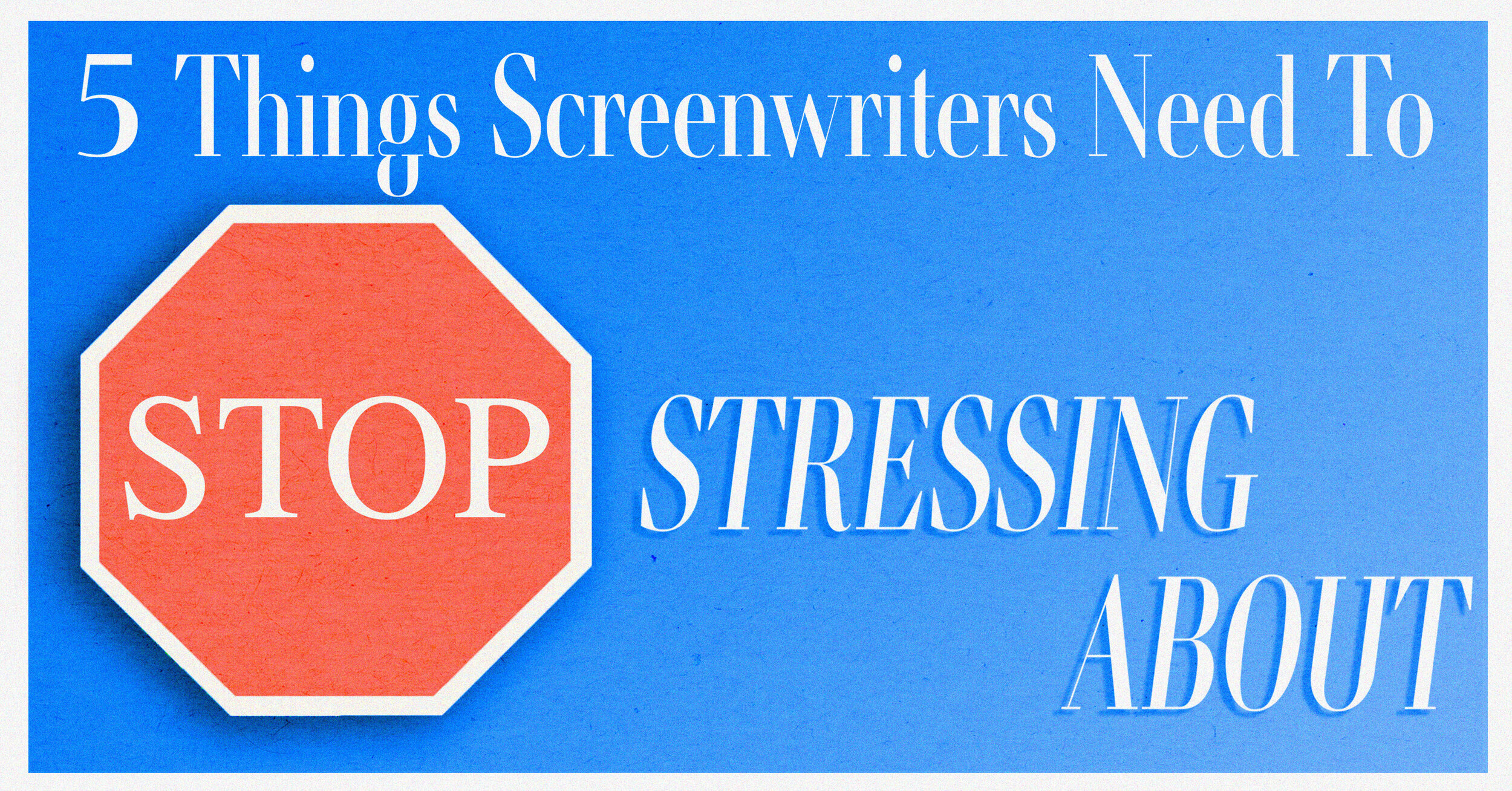5 Things Screenwriters Need to STOP Stressing About Now!
Stress Blog.jpg
Screenwriters have a lot to worry about. Writing a blazing hot script, finding time to write said hot script, landing representation, making a good impression over Zoom meetings, juggling a day job with writing and networking during a pandemic… the list is endless.
Between the stress of screenwriting and the seemingly constant ups and downs of the COVID-era, life can feel like a lot. So I want you to take a breath and take a break from worrying about these things.
Here are 5 things every screenwriter can STOP stressing about:
1. “Everyone is out to steal my screenplay!”
One way I can tell a newbie to the business is that they get very precious (and paranoid) about their scripts - talking about their plot in hushed whispers, swearing their writers group to secrecy, and generally being anxious that anyone and everyone is out to steal their work. To be clear - the second you write your script, it is copyrighted by you. It’s the law. Sure, you should still be “aware” when sharing your screenplay, there are still some shifty ‘wanna-be’ producers and writers out there - but almost no one worth their salt is going to risk a lawsuit. If any Hollywood pro wants your idea that badly, they’ll just buy it from you. So relax. Plus, if you’re still worried, by all means legally copyright it or register it with the WGA - more info on how to do that in this blog post - there’s nothing wrong with added protection and peace of mind. But don’t let paranoia get the best of you - if someone in Hollywood (who actually seems credible) wants to read your script - let them.
2. “I have to write a script that’s ‘on trend’”
A lot of screenwriters get stuck trying to come up with an idea that capitalizes on the zeitgeist. If you happen to come across something that’s ‘on trend’ and inspires you great - but if you’re doing it to try and write a script that will be sure to sell - stop. I always tell my clients and mentees, don’t chase the marketplace! For one, Hollywood rarely knows what they want until they see it. You will never be able to guesstimate what kind of screenplay will sell (Phoebe Waller-Bridge wrote Fleabag because it was a story and character she loved, not because she thought it would win a bunch of Emmy’s). And two - if you’re spending all your time worrying about what idea is worth investing in, you’re not writing. Stop stressing about what the industry might want and start writing a story that excites you - who knows, maybe it will land you Fleabag level success.
3. “I have to SHOW the director how my movie works.”
If you are a multi-hyphenate and plan on directing your own screenplay, than write as much direction into your script as you want to. But if you’re like most aspiring writers, and are writing a script to try and land a rep, get in a writers room, or sell your brilliant idea so someone else can direct it - don’t worry about “directing on the page”. Don’t get me wrong, you need to write clear and vivid descriptions, but don’t write in every specific camera angle. When you include every ‘zoom in’, ‘medium shot’, and ‘close up’ in a script it slows down the read (which is the last thing you want). All that to say, if a specific cut, transition, sound effect, wardrobe choice, or set piece is integral to your story then by all means include it. But don’t worry about every single detail - leave those choices up to the amazing director who will be hired once you sell your brilliant script.
4. “I have to make sure I describe my fight sequence in PERFECT detail.”
The same rule above applies to fight sequences and choreography - focus on what’s integral and don’t worry about the rest. When you’re writing an action sequence you want it to feel dramatic, tense, full of anticipation and surprises - but don’t describe them in so much detail that it slows down the read of your script to a crawl. It can actually make the images less vivid for your reader - it’s easy to get lost in too much detail. Don’t describe every single kick, punch and explosion - that’s what fight choreographers and stunt coordinators are for. If you want some inspiration on this, check out Jordan Peele’s screenplays for Get Out or Us. He has a way of writing action that feels specific and exciting without describing every single movement.
5. “If I don’t land a rep in the first few years of being a screenwriter, I’m a failure.”
One of the biggest stressors for new writers is landing a rep. Some writers become so obsessed with it that getting a rep becomes more important than writing itself. If you want to succeed as a screenwriter you will eventually need representation, BUT (and it’s a big but) first worry about becoming a great writer. When you do get your work in the hands of an agent or manager you want it to be undeniably great - most writers only get their screenplays read ONCE and if it’s not blazing hot you’ll get nowhere. So if you’re new to the game, let the “rep worry” go and focus on becoming the best screenwriter you can be, finish 3-5 blazing hot screenplays, and learn to write like a professional (most professional writing assignments only give you 2-3 months to write a solid first draft - can you keep up with that timeline?). Let these things be your priority, then when it comes time to worry about reps, you and your work will be ready to land someone great.
How do you overcome common ‘writer stresses’? Let me know @CaroleKirsch!

